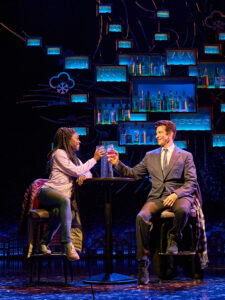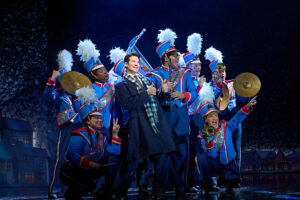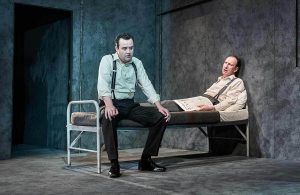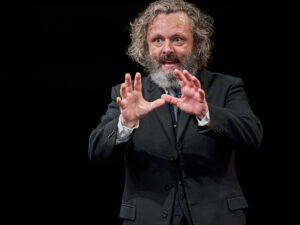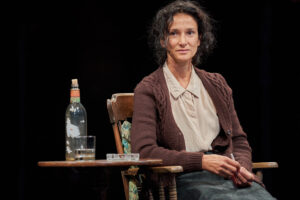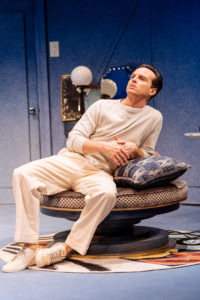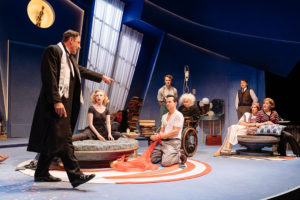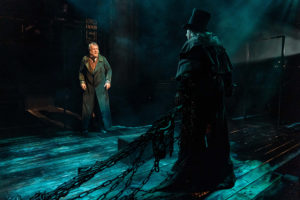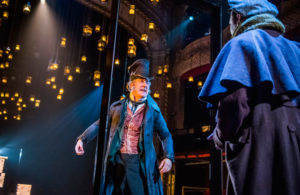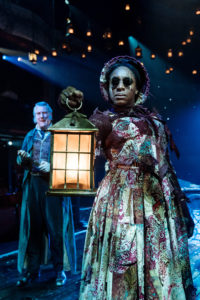A visceral performance from Rosie Sheehy in Sophie Treadwell’s classic expressionist drama
★★★★
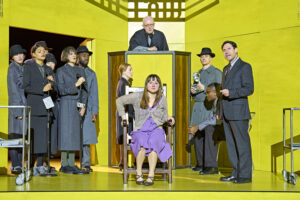
Machinal was written in 1928 by Sophie Treadwell who based her expressionist play on a recent true crime story of a woman who had murdered her husband. In this review, I’ll try to define expressionist theatre and describe a performance that could be the launch of a stellar career.
But let’s start with the title. In recent years it has tended to be pronounced ‘MaSHinal’. The logic is that it’s a French word and that’s how the French pronounce it. However, the word means ‘mechanical’ so there is a logic to pronouncing it ‘MaCKinal’, if you want to convey the theme of a play in which a woman is crushed by a mechanised, soulless society. Indeed, that’s how it was pronounced during the original Broadway production back in 1928. Add to that, the current lead Rosie Sheehy says that’s how it’s pronounced, and since she is what turns this production from good to great, I would be happy to accept that. Except… the playwright Sophie Treadwell said it should be pronounced ‘MaSHinal’. And given that the play shows a woman being marginalised and ignored, it seems wrong to do that to the author. So, with due respect to Rosie Sheehy, I’m sticking with with ‘MaSHinal’.
Machinal tells the story of a young woman- named only at the end- who feels trapped by society, is repelled by what goes in around her, and is consistently betrayed by men. We see her feeling claustrophobic on a crowded train, in an office where she is struggling as a typist and mocked for her lateness by her colleagues, at odds with her unsupportive mother played by Buffy Davis, unhappily at home with her repulsive husband- a slimy businessman played by Tim Frances. Then, she is liberated by an affair. After that, there is no going back, and she frees herself from her husband- and stop reading now if you don’t want a spoiler, although I think it is expected by all involved that you will know she goes on to kill her husband- and is then tried by judge, jurors and lawyers who are all men.
All this is told as a piece of expressionist theatre. Expressionism is in many ways defined by what it’s not. What it is not is naturalistic or realistic- the dialogue, the acting, the sound, the whole production combine to evoke a visceral reaction from the audience. Of course, naturalistic theatre can evince an emotional response but that comes from our observation and identification with the drama.
A gripping production
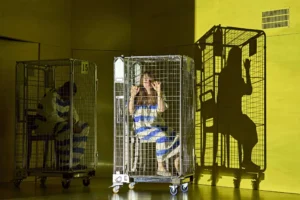
Sophie Treadwell divides her play into nine scenes, although Richard Jones‘ production, which originated at the Theatre Royal Bath, adds an opening scene in which the Young Woman is entrapped on a train. Each scene has a generic title that is raised above the set, like ‘At Business’ or ‘Law’. While everyone else is sharp suited , wearing black or grey, and moving with precision, Rosie Sheehan’s character is sweaty and clad in an ill-fitting blue dress. She too doesn’t fit. She’s not even comfortable in her own body, moving jerkily and nervously. While not actually shy, when she speaks, she is often inarticulate and stuttering as she tries to express her need for freedom.
The machine-like life around her, driven by industrial capitalism, is shown, not only by the way people look, but by the way they move mechanically, and talk in repetitive language. The set, designed by Hyemi Shin, is a bright, sickly mustard yellow that forms a triangle on the stage with the apex at the centre back, reinforcing the idea of being trapped. The blank walls at times accommodate doors and apparent windows. Props are wheeled on and off.
Sound, designed by Benjamin Grant, is often sharp, discordant and industrial, setting us on edge- for example, a pneumatic drill accompanies the woman giving birth- although sometimes there is the more comforting sound of a spiritual. Adam Silverman‘s lighting design is stark, sometimes strobe, and on a couple of occasions disconcertingly pitch black. One of those times is the moment she experiences sexual ecstasy with her lover played by Pierro Niel-Mee. Significantly, this and other key transformative moments in the woman’s life are not actually shown, which means we are not distracted from the way she is abused and crushed by the men who rule her life and society as a whole.
It occurred to me that the scenes are almost like the Stations of the Cross which depict Jesus heading for his crucifixion.
We don’t gain a lot of insight into the woman’s character. Although a modern audience might suspect she has mental issues of some kind, she is deliberately portrayed as quite ordinary, boring even. She is an Everywoman. The play doesn’t excuse her actions but it does explain the pressures that led her in the direction she took. What is great about Machinal and Rosie Sheehy‘s anguished performance is that we experience at a molecular level the woman being torn apart. Yes, there are moments when it becomes melodramatic, but the one hour and 50 minutes, without interval, fly by in this gripping production.
Coincidentally, there is a new exhibition at Tate Modern which looks at a group of expressionist artists from the early 1900s called Blue Rider that included Wassily Kandinsky, Gabriele Münter and Marianne Werefkin. Incidentally, given the feminist standpoint of Machinal, it’s interesting that Blue Rider included and respected female artists, which wasn’t the case with Sophie Treadwell working in theatre. The exhibition is well worth a visit, and the range of work, from the clearly representational to virtually abstract, shows that the common feature of expressionism is an attempt to use shape and colour to convey the feeling of a person or place, rather than the more visually accurate observations made by their predecessors, such as the Impressionists. There are times when you enter a room, it feels like the paint has been thrown in your face.
Machinal is at the Old Vic until 1 June 2024. Click to buy tickets direct from the theatre
Paul was given a review ticket by the theatre.
Click here to see this review on the YouTube channel Theatre Reviews With Paul Seven
